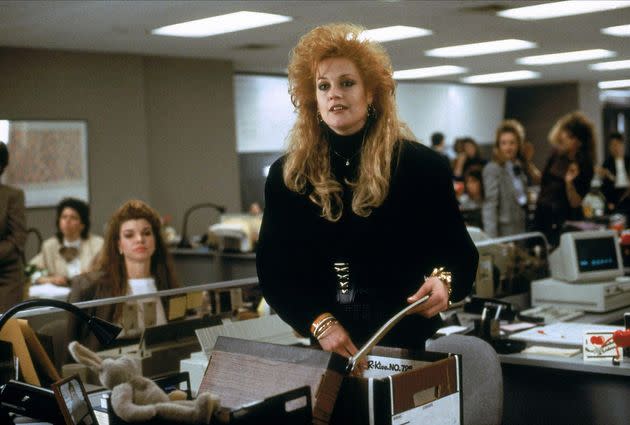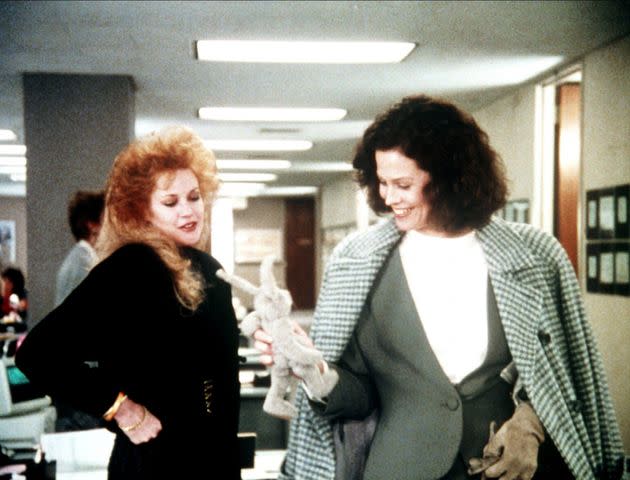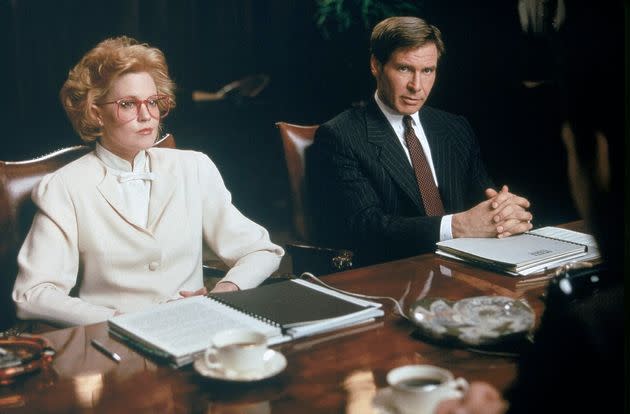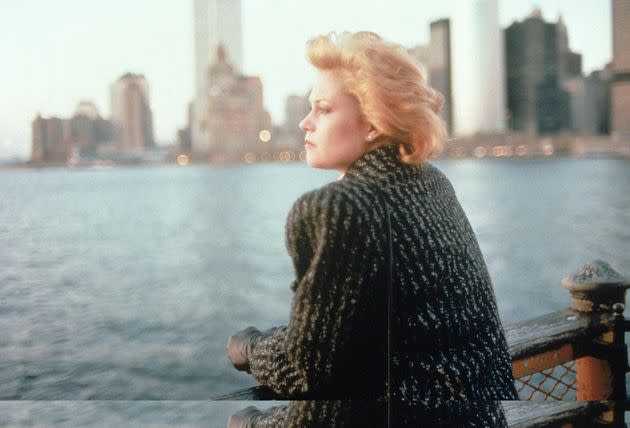How ‘Working Girl’ Changed My Career Trajectory

The night I lost my last job in corporate fashion, I walked home crying with an overflowing cardboard box. This had been my biggest role and my highest salary to date: working for the female head of a then-popular flash-sale-shopping website.
I’d approached the job with giddiness and hope. Four months after I started, my charismatic boss took a mental health sabbatical and didn’t return. She was replaced by the 26-year-old chief financial officer, who promptly told me he was proudly self-sufficient.
“Sorry, but you’re just not necessary here anymore,” I recall him coldly telling me.
It was 2012. I was 31 years old and had a new disdain for an industry I’d once loved. I’d been the executive assistant to CEOs in big-name brand fashion companies for a decade, and the only job I was qualified for was as someone else’s right hand. My résumé was filled with leaders I’d reported to and mostly reflected things I’d accomplished for others but never for myself.
Later that night, I called my new boyfriend (and future husband) to tell him the news. Shortly after, I fell asleep, fully clothed, watching one of my favorite films, “Working Girl,” the 1988 Mike Nichols classic starring Melanie Griffith, Sigourney Weaver and Harrison Ford, which turned 35 in December. When I put on the DVD that night, as I had many times before, it was purely cathartic during a moment that felt like the end of the world. I didn’t know it would help to ignite a whole new beginning.
In the film, Griffith is executive assistant Tess McGill, who is passionate, smart and dreams of a career beyond serving coffee. However, her life and career are stifled by men and women who lie, cheat and hold her back. In one early scene, she’s tricked by a male colleagues into a situation she believes to be a job interview. Instead, a slimy stockbroker (Kevin Spacey) shows her a porn video.

When she gets a new job working in Mergers and Acquisitions for the beautiful and successful Katherine Parker (Weaver), she finally feels heard ― Until she learns her new mentor is more manipulative than the men, and, unlike them, she’s pretending to be something she’s not. After learning her boss stole her idea, Tess takes advantage of a situation (a ski accident that conveniently ties up Katherine) by pretending to be an executive. Tess reclaims her idea and finds power and love in the process.
The character of Tess McGill was ingrained into my psyche since I saw her on screen at just 8 years old. I’m not sure why I related to her so much. I was a child and didn’t relate to her shoulder-padded ’80s suits or the sexism she faced in the workplace. However, I did have one connection to the film. I went to school with a classmate whose beautiful, vine-covered Gramercy Park corner townhouse was the set of Katherine Parker’s home.
I didn’t know that years later I’d find myself relating to Tess and the struggles of working in a high-powered world that would eventually shut me out.
When I began what I thought would be my career, I initially felt powerful. I was the gatekeeper, the one people came to for everything. I wore my stilettos and pencil skirts like a proud uniform. Two years into my first big job, news hit that layoffs were coming, and I assumed my role was too important to be affected. I was wrong. They eliminated my position and gave it to two interns who were paid half my salary.
At my next job, with another fashion brand, I reported to two much older white men who spent weekends in West Palm Beach, Florida, and called me “hon.” They routinely dismissed me, and when I begged for more responsibility, they tried to placate me by announcing I could sit in on meetings. This excited me until I was handed a yellow legal pad and instructed, “Don’t ever speak. Just record notes of every single thing we say.” On another occasion, while checking my boss’s emails as he’d specifically instructed, I stumbled upon one from a female co-worker who said, “Blake is pathetic, she thinks she has value here,” to which he replied “LOL.”

By then, many illusions about the industry and my part in it had waned. During weekends, I wrote for my personal blog. Somewhere in the back of my head, I dreamed of being a writer, but it was never something I realistically entertained. I needed a big salary to pay rent and fund my single-girl lifestyle, so I’d convinced myself working at a big corporate company was vital for my personal life and career. That line of thinking seemed reasonable, but it kept me stagnant and stopped me from attempting to find a real purpose.
It took those words from my final fashion boss, “You’re not necessary here,” for the veil to finally lift.
I thought of Tess, one of my favorite female film characters, who always remained in the back of my imagination. She offered a vision of what can be accomplished when someone doesn’t fear failure or pushback. When I rewatched the movie, her words reverberated through my head. Especially one line, when she pushes back against her best friend who has told her to stop living a fantasy.
“I’m not gonna spend the rest of my life working my ass off and getting nowhere just because I followed rules that I had nothing to do with setting up,” Tess says.
By the end, Tess has confessed the truth to boyfriend and business partner Jack, who helped her pitch her innovative idea to the powerful mogul Oren Trask (Philip Bosco). In the process, Tess exposes her boss. Despite her manipulation, Oren remains impressed.
“You’ve got a real fire in your belly,” Oren says before offering her a job with his company.
“I’ve got something in my belly, but I think it’s nervous knots,” Tess replies.
Though I never faked my identity or anything remotely as cinematic as in “Working Girl,” the notion resonated. There was a fire in my own belly that wanted something more for myself. I finally acknowledged my unfulfilled passion, one that had been dormant for so long: I wanted to be a writer, but I was always too plagued by fear of failure and a lack of self-confidence.

Tess’s career trajectory — from assisting others to executing her own ideas on her terms — is what encouraged me to step out of my own small box and strive for more.
When Tess comes up with her life-changing idea — for the multimillion-dollar company Trask to buy a radio station — it comes to her while she’s scanning The Wall Street Journal on her daily commute to Manhattan on the Staten Island Ferry. Even as a young girl, this stood out to me. Decades later, I often sit with a newspaper and search for inspiring articles. When I find something eye-catching, I have a clear visual of Tess doing the same thing. In the final moments of the movie, Tess arrives at her new job, assuming she’s again the assistant. When she realizes the corner office is hers, she excitedly puts her feet on her new desk as Carly Simon’s “Let the River Run” plays and the camera pans out to show the Statue of Liberty.
This scene allowed me to dream bigger and served as an inspirational vision board. The corporate world is now far behind me; and though it gave me daily consistency and certainly more money, the feeling of seeing my byline on a story is an accomplishment that makes me feel like Tess at the end of “Working Girl.”
I still routinely walk by that Gramercy Park townhouse that was once part of the “Working Girl” set. Thirty-five years later, it’s a reminder of the powerful effect the film still has in my life.


